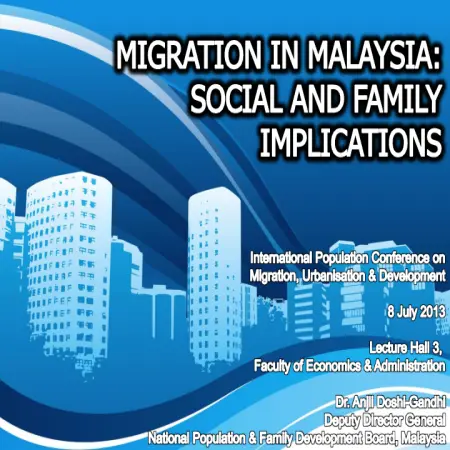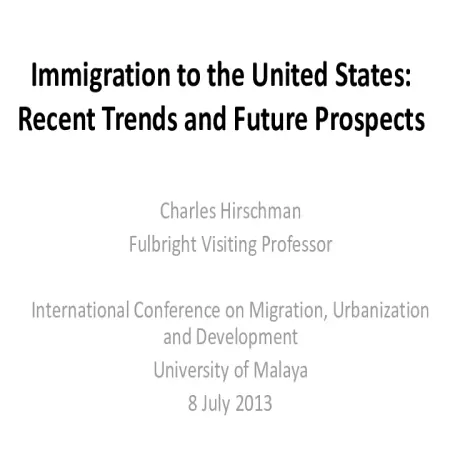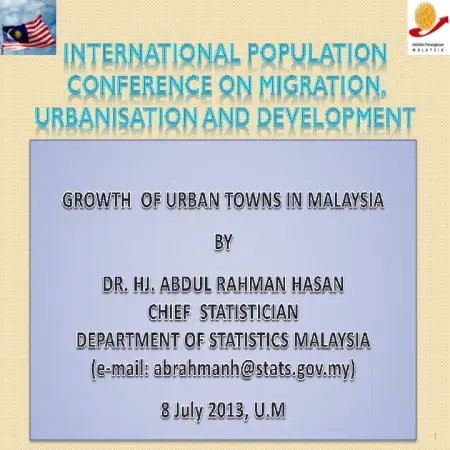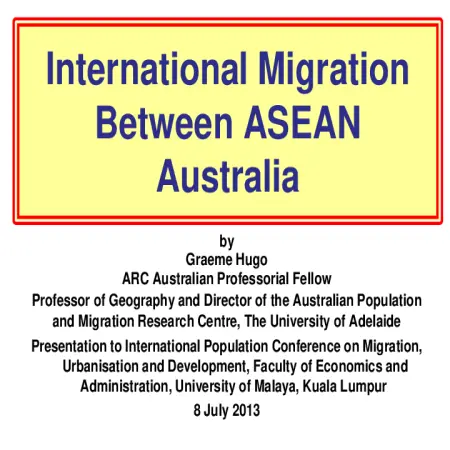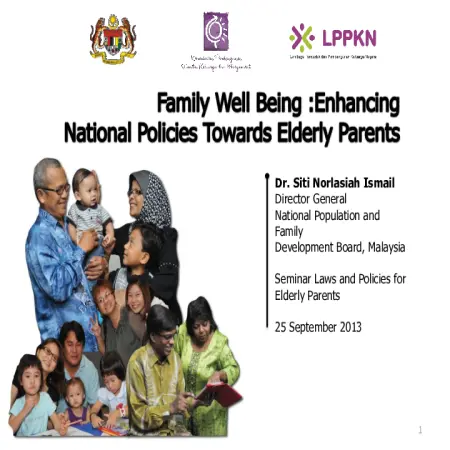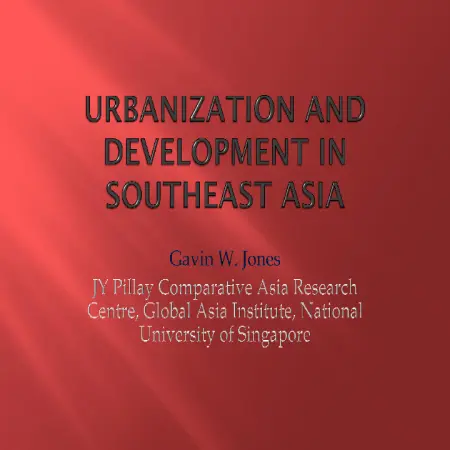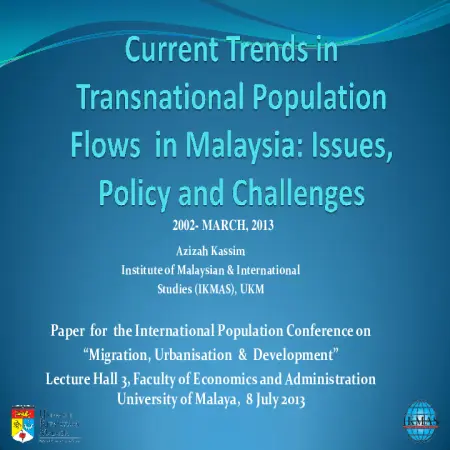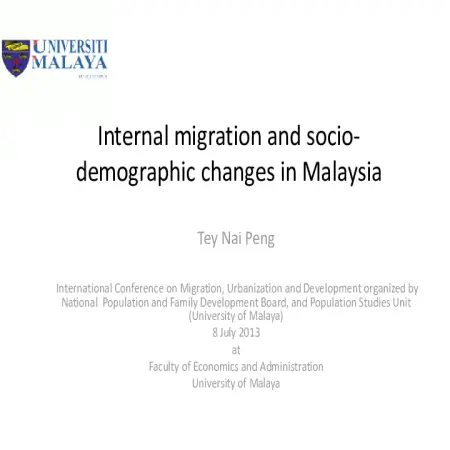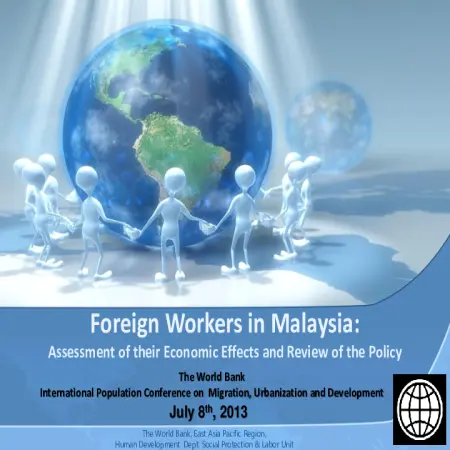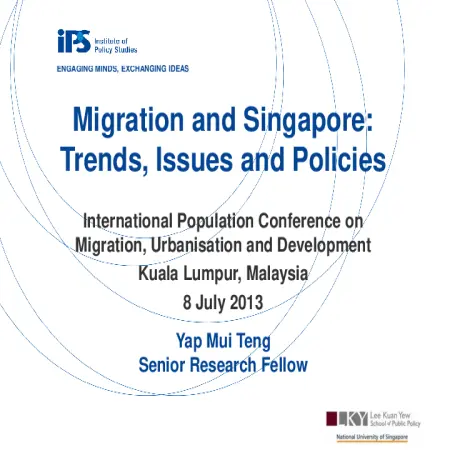Advanced Search
|
|
Migration in Malaysia: social and family impact
Item Type: Conference or Workshop Item
Editor:
Year: 00/00/2013
Abstract: This paper highlights the key findings from surveys done by the Ministry of Women, Family and Community Development (MWFCD) and the National Population and Family Development Board (NPFDB). The Survey on the Implications of Employing Foreign Domestic Helpers (FDH) on the Family Institution in Malaysia was conducted by the MWFCD in 2009. The study found that many families rely on FDH for child care and domestic work. Some of the families find that having a FDH has a negative effect on their family relationships while some have no problems with it. The study on Indonesian Migrants in Tawau, Sabah conducted by the NPFDB in 2010 found that the local community in Sabah felt that the presence of Indonesian migrants in their community had both positive and negative effects. The effects of migrants were studied from the perspective of economy, education, health, safety, culture, housing and neighbourhood.
|
|
|
|
|
|
Immigration to the United States: recent trends and future prospects
Item Type: Conference or Workshop Item
Editor:
Year: 00/00/2013
Abstract: The United States is popularly known as a “nation of immigrants.” For recent immigrants and their descendants, this term means that they belong part of a long tradition of peoples who came the United States seeking economic opportunity, fleeing injustice or oppression in their homeland, and a better life for their children. Long term residents of the United States, those who immigration experience is several generations in the past, often have mixed feelings about new immigrants. They may be very proud of their immigrant forbearers from Italy, Poland, or Ireland, but this historical experience does not always generate sympathy for recent arrivals. They often think the new immigrants are somehow different and less deserving than those who arrived in the past. These beliefs about new immigrants are based on assumptions of difference--the recent newcomers have a different religion, a different language, or are from a different country that will make them less likely to assimilate to American society and culture. Then, there is a significant proportion of Americans are strongly hostile to new immigrants – they would like to stop all immigration and even to expel those who are already here, including the estimated 12 million immigrants who do not have any legal standing to be in the US. This ambivalence about immigration, and even hostility to immigrants, is part of the fabric of American society, past and present. Immigrants from around the world have been coming to the United States in large numbers for almost 4 centuries, long before the founding of the nation in 1787. Although immigrants are often welcomed, particularly by family and friends from their homeland, they often encounter indifference and occasional prejudice from long resident Americans. In this overview, I survey the trends in immigration to the United States with a focus on the most recent period. Current levels of immigration are very high, but relative the national population. In fact, the portion of the US population that is foreign born (or the children of the foreign born) was even higher during the first decade of the 20th century and during the 1840s and 1850s. These earlier waves of mass migration generated an extreme levels of American nativism that were much hostile than those at present. There was a significant number of Chinese, Japanese and Filipino immigrants in the late 19th and early 20th century, but the majority originated in Europe. At present, about half of new immigrants come from Mexico and other Latin American countries, and about one-quarter come from Asia, including China, India, Vietnam, and the Philippines. In the 1970s and 1980s, most immigrants settled a few states, particularly California, New York, Texas, Florida, and Illinois. In the 1990s, immigrants spread out to “new destinations,” including small towns and cities in the South and Midwest. They are not the poorest of the poor. Some immigrants arrive with very high educational credentials and play a disproportionate role in the American high tech sector. In general, the children of immigrants do very well in American society, both educationally and economically. Immigrants and their children are also distinctive in terms of their determination to succeed. Of course, not all immigrants are successful. Some join gangs and experience downward mobility. They may even adopt attitudes that reject the goal of social mobility. But, all in all, most empirical research shows that contemporary immigrants are making a positive contribution to American society, just as earlier waves of immigrants did.
|
|
|
|
|
|
Growth of urban towns in Malaysia
Item Type: Conference or Workshop Item
Editor:
Year: 00/00/2013
Abstract: Malaysia has experienced an outstanding growth of urban towns since its formation in 1963. The shift from agricultural to an industrial based economy has inevitably led to rapid physical, social and economic changes. The impact of urban spatial transformation accentuated the growth in the number of urban towns with urban centres increasing in size and expansion of major towns outwards to sprawl into peripheries. This paper highlights the growth of urban towns in Malaysia based on the data available from the 1970, 1980, 1991, 2000 and 2010 Population and Housing Censuses. The data reveals a surge of growth in number from 72 towns in 1980 to 228 towns in 2010. The increase in the growth of urban centres and the urbanization process is the result of spatial transformation, demographic phenomenon and various government measures for a measureable balanced development.
|
|
|
|
|
|
International migration between ASEAN Australia
Item Type: Conference or Workshop Item
Editor:
Year: 00/00/2013
Abstract: International migration is an increasing influence in ASEAN. The 2013 United Nations Population Report indicates that ASEAN had the third fastest growing international migration currently of all world regions over the 2000-13 period. This presentation examines the global context in which this increase in mobility is occurring. It summarises the main elements in this increased importance of migration. It focuses then on recent developments in the migration relationship with Australia. Australian international migration data is of very high quality and allows the movement between ASEAN countries and Australia to be qualified. It detects permanent immigration and emigration as well as non-permanent moves. It is demonstrated that the migration relationship between ASEAN and Australia is emphatically an interacting one. It is a system rather than a south-north movement. The characteristics of migrants are examined and issues of brain drain addressed. The paper considers some policy dimensions of the migration relationship for development in ASEAN.
|
|
|
|
|
|
Family well being: enhancing National Policies towards elderly parents
Item Type: Conference or Workshop Item
Editor:
Year: 00/00/2013
Abstract: Malaysia will be aged by the year 2030. The objective of National Policy for Older Persons, 2011 is to enhance the respect for and self-worth of the elderly in family, society and nation, to develop the potential of the elderly so that they remain active and productive in national development and to create opportunities for them to continue to live independently and to encourage the establishment and the provision of specific facilities to ensure the care and protection of the elderly.
|
|
|
|
|
|
Current trends in transnational population flows in Malaysia: Issues, policy and challenges
Item Type: Conference or Workshop Item
Editor:
Year: 00/00/2013
Abstract: In the last 40 years there has seen a substantial increase in Malaysia’s foreign pop. According to the last National Census in 2010, out of a pop of 28.4 million, over 8.3% are non-citizens. The increase is mainly the result of labour inflow since the early 1970s due to Malaysia’s relatively better economic development and political stability which attract economic migrants and asylum seekers from within and outside the ASEAN region. This paper which focuses on current transnational flows in the country has the following objectives: 1. To provide an overview of transnational population flows in Malaysia in the last decade and identify major streams that are causing considerable concern to the state and the Malaysian public. The focus is on the low skill foreign workers, the largest category of migrants in Malaysia. 2. To examine public perceptions of foreign workers, how such perceptions are formed and what their impacts are on state policy. 3. To discuss the state policy on foreign workers, both legal and irregular, the objective of the policy and its strategies. 4. To highlight the challenges faced by the state in implementing the foreign worker policy. 5. To evaluate the achievement and shortcomings of the policy. The writer identifies five types of transnational inflows into Malaysia i.e. that of low skill migrant workers both legal and irregular; asylum seekers; expatriates; foreign students; and participants of Malaysia’s My Second Home (MM2H) project.
|
|
|
|
|
|
Internal migration and socio-demographic changes in Malaysia
Item Type: Conference or Workshop Item
Editor:
Year: 00/00/2013
Abstract: This paper re-examines the levels, trends and patterns of internal migration, followed by some discussions on the causes and consequences of internal migration in Malaysia in 1991 and 2000. A more up to date analysis awaits the release of migration data from the 2010 census. The focus of this paper is on inter-state and inter-regional rather than intra-state migration as more people moved across states than within state. Key questions to be addressed include the reasons for the high concentration of migration in the Klang Valley since the 1970s, migration selectivity in terms of age, education and ethnicity. The migration impact on socio-demographic changes and policy issues will also be examined.
|
|
|
|
|
|
Foreign workers in Malaysia: assessment of their economic effects and review of the policy
Item Type: Conference or Workshop Item
Editor:
Year: 00/00/2013
Abstract: This study aims to help Ministry of Human Resource to better manage existing human resources in the country and to plan for the development of future human capital needs.
|
|
|
|





